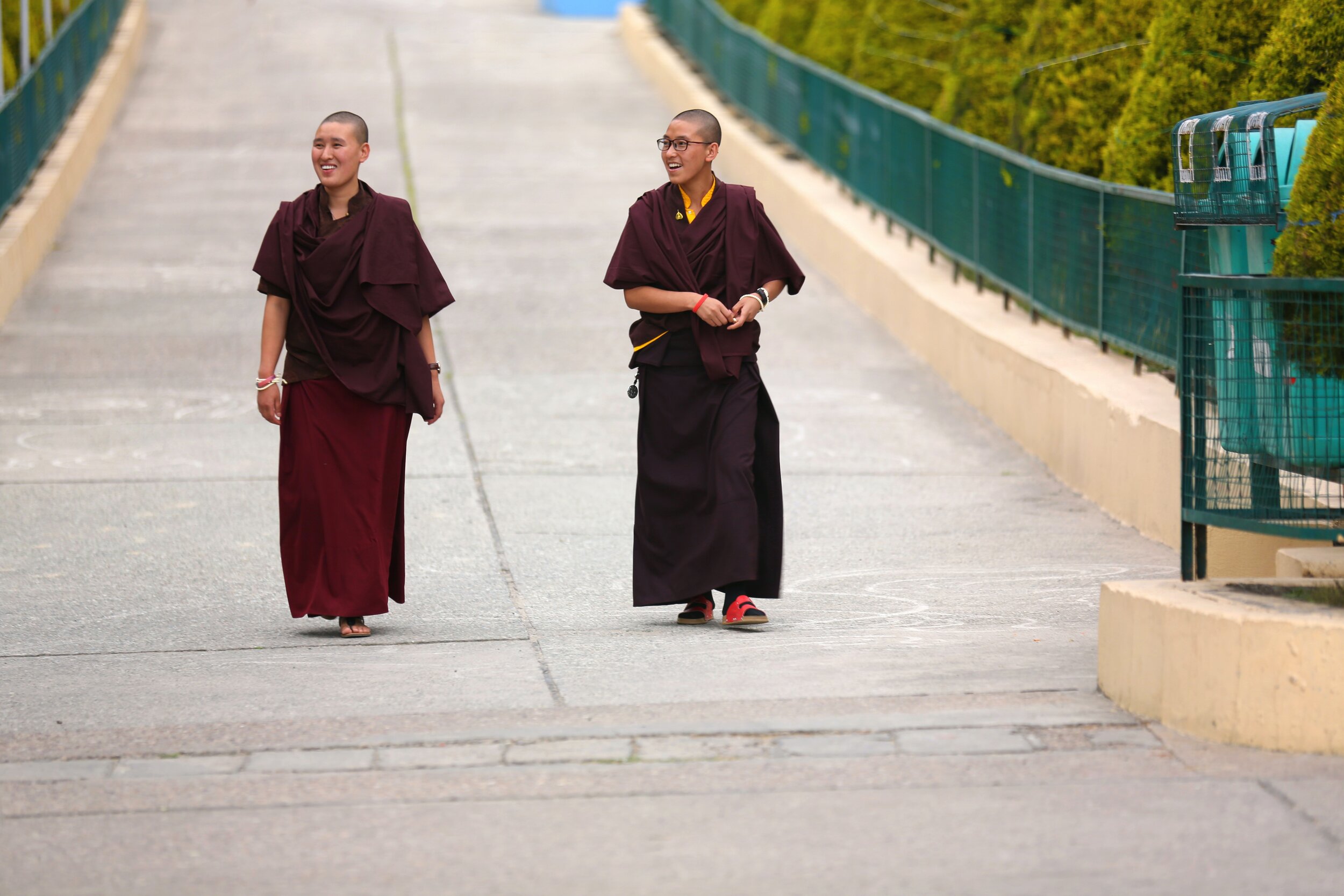Buddhist Concepts for Dealing with Challenging Times by Jeremy Trollope
Buddhist philosophy believes that it’s possible to alleviate any suffering.
Wait what? Any suffering? Come on. Horrible and unbearable things happen all the time. How can that even be possible?
It is. I strongly believe that an understanding of Buddhist philosophy can help us deal with the pain we all experience and guide us towards a life with less suffering.
Dependent Origination
Dependent Origination is the idea that nothing is completely separate from everything else. Every separate object we perceive is actually a combination of a bunch of ‘dependent’ factors.
For example, I’m typing on a computer which seems like a distinct object. But what my computer physically is, is a bunch of plastic, metal, and probably other stuff that I don’t know about, all put together in a certain way. The existence of my computer is dependent on the existence of the factories that built it, the workers that took the materials from the ground, and many, many other things. You can apply the same logic to any object or person you can think of. Everything is related to everything else in the complicated web of Dependent Origination.
The implication of this idea is that everything is deeply interconnected. This is especially true for human beings because we can have such a strong impact on each other. Understanding Dependent Origination and interconnectedness can help illustrate 2 key things: 1) We are all in this together and 2) Every action we take has an impact on the world around us.
We can sometimes see ourselves, our families, or even our nations as being separate from the rest of the world. That’s an illusion. The truth is that we’re all connected through the complex web of Dependent Origination. This helps stress the importance of helping others in any way possible. When you help others, you’re indirectly helping yourself. Not only by making yourself feel better, but by bringing more happiness into this interconnected world we live in.
Also, Dependent Origination implies that every action we take, positive or negative, has a far-reaching impact. For example, giving a bit of change to a person on the street won’t help them immediately get their life together. But with that change, they might buy food from a store, the store can then pay its employees, and those employees take care of their families, and so on. Seeing each tiny action you take as having a bigger impact can make you feel less helpless in trying to fix the world.
Impermanence
Impermanence is the idea that things are constantly changing and everything will eventually be gone. My couch is going to eventually end up in a dumpster and decompose, my delicious fruit Gushers will eventually get eaten, and that annoying car alarm will eventually stop blaring. If you think you can come up with something permanent, then you haven’t thought far enough into the future. Eventually, everything will fade away.
Falsely thinking that things can be permanent makes us suffer in 2 ways: 1) When we want good things to last forever, and 2) When we feel like the bad things happening right now are permanent.
Positive things like a nice vacation or a music festival are nice and should be cherished while they’re experienced. But the sad truth is that those things won’t last forever. When we want positive things to last forever, we start clinging onto the things that made us happy in the past, or frantically try to protect things we’re afraid of losing in the present. If you think about it, longing for the past or being terrified of losing something can cause a lot of suffering. But once you get into the habit of reminding yourself of the impermanence of good things, you can feel yourself being freed from that suffering, and learn to remember good times fondly without grasping at them.
Understanding impermanence also helps in dealing with pain. When we experience pain, our immediate response is to get rid of it as soon as possible. But a lot of the time, no matter how hard we try, it just doesn’t go away. This can give us a false sense that we’ll be in pain forever. But impermanence reassures us that all pain will slowly fade away, if we have patience. So if we can try to shift our focus from the pain that just won’t go away, to ways of coping with that pain until it’s gone, we can live a life with less suffering.
One can argue that some pains are ‘permanent’. What if I got into a car crash, and I was wheelchair-bound for the rest of my life? The truth is that the pain of being in a wheelchair will slowly become less over time. Eventually, it would become a normal part of my life. There will be a lot of suffering, but that suffering is made worse by refusing to accept the new reality. Being patient through pain rather than trying to make it go away can make it hurt a lot less.
The first 2 concepts summarize the Buddhist understanding of the world around us, that everything is always changing and is deeply connected. The next 2 concepts, are about us as individuals, and why our lives are so important.
Samsara and karma
Samsara is a Sanskrit word that roughly translates to ‘the cycle of life, death, and rebirth’. Samsara is where we are right now. We’re experiencing life, we were born, and we’ll eventually die. Karma is the idea that our actions and intentions have consequences that we face in the future. If we help others right now, they will like us and will help us in the future. If we are selfish and treat others poorly, they will dislike us and our life will have more conflict in the future.
Karma in this life is believed to determine the outcome of the next life. If we have issues that we didn’t work through or try to resolve, they will keep coming back until we can learn to grow from them. This stresses the importance of continuing to work through our pain, no matter how challenging it may be, so that we can accumulate better Karma and suffer less in the future.
Some may think these ideas are ‘unscientific’ or ‘superstitious’ and dismiss them. But I think there may be evidence that reincarnation is a reality of our existence. Check out my article here if you’re interested.
And even if it might be ‘wrong’, in believing in the afterlife, isn’t enjoying life the most important thing regardless of what you think happens after? Why not embrace a philosophy that can make you happier?
To summarize, Buddhist philosophy believes that all suffering is rooted in the false beliefs that we are separated and that things can last forever. The philosophies of Dependent Origination and Impermanence illustrate that these are false perceptions. The Buddhist philosophy of life and death stresses the importance of living a good life, and can help to cope with the grief of death.
I hope these concepts can help you deal with the pain that you may be experiencing. For now, stay strong, stay positive, and keep moving forward.
Namaste,
Jeremy




